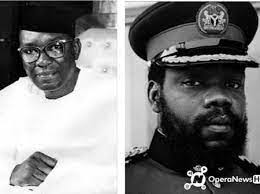By Chief Richard Akinjide
Chief Richard Akinjide who was a Cabinet member in the Government led by slain Prime Minister Tafawa Balewa
Chief Richard Akinjide, a former Attorney General and Justic Minister for narrated that The G.O.C , General Aguiyi Ironsi, said he wanted to see all the cabinet ministers.
According to Akinjide: “And so we assembled at the cabinet office. Well, I have read in many books saying that we handed over to the military. We did not hand- over. Ironsi told us that ‘you either hand over as gentlemen or you hand-over by force’. These were his words. Is that voluntary handover?
So we did not handover. We wanted the Acting Prime Minister to be in place but Ironsi forced us, and I use the word force advisedly, to handover to him. He was controlling the soldiers.
The Acting President, Nwafor Orizu, “who did not co-operate with us cooperated with the GOC. Dr Orizu and the GOC prepared speeches which Nwafor Orizu broadcast, handing over the government of the country to the army. I hereby state categorically as a member of that cabinet that we did not handover voluntarily. It was a coup.”
Below is from the speech delivered Chief Richard Akinjide, SAN, at the public presentation of the first edition of the book “Fellow Countrymen – the story of Coup D’etats in Nigeria,” by Richard Akinnola on June 12, 2000)
“I have read this book from cover to cover. This is a fantastic book. I want us to find a way to ensure that many Nigerians read this book.
It is a raw material for future authors.
Talking of the first coup, when Balewa got missing, we knew Okotie-Eboh had been killed, we knew Samuel Akintola had been killed. We the members of the Balewa cabinet started meeting. But how can we have a cabinet meeting without the Prime Minister acting or the Prime Minister presiding. So, unanimously, we nominated acting Prime Minister amongst us and we continued holding our meetings.
Then we got a message that we should all assemble at the Cabinet office. All the Ministers were requested by the G.O.C. of the Nigerian Army, General Aguiyi Ironsi to assemble. What was amazing at that time was that Ironsi was going all over Lagos unarmed.
We assembled there, having nominated Zana Diphcharima as our acting prime minister in the absence of the Prime Minister, whose where about we didn’t know. We approached the acting President, Nwafor Orizu to swear him in because he could not legitimately act as the Prime Minister except he was sworn in. Nwafor Orizu refused. He said he needed to contact Zik who was then in West Indies.
Under the Law, that is, the interpretation Act, as acting President, Nwafor Orizu had all the powers of the President.
The G.O.C said he wanted to see all the cabinet ministers. And so we assembled at the cabinet office. Well, I have read in many books saying that we handed over to the military. We did not hand- over. Ironsi told us that “you either hand over as gentlemen or you hand-over by force”. These were his words. Is that voluntary handover? So we did not handover. We wanted the Acting Prime Minister to be in place but Ironsi forced us, and I use the word force advisedly, to handover to him. He was controlling the soldiers.
The acting President, Nwafor Orizu, who did not co-operate with us cooperated with the GOC. Dr Orizu and the GOC prepared speeches which Nwafor Orizu broadcast, handing over the government of the country to the army. I hereby state categorically as a member of that cabinet that we did not handover voluntarily. It was a coup.
This is a very good book, which everybody must read. It is a raw material for future authors. Anybody, who wants to know some of the causes of our problems and military instability should read this book. I recommend this book to all universities and secondary schools, so that they can know how we got to where we are now. What this book shows is that if anybody stages a coup and if people don’t accept it, it would not succeed.
What puzzles me is how the author got all these materials. He must have contacts in high and sensitive places.These materials should not be in archives, they should be in public domain so that we know the causes of our problems.
I pray that all Nigerians should rise up and say no if anybody seizes a radio station and says “Fellow countrymen”. I hope that this book will find a way into all university libraries throughout this country, to all secondary school libraries and abroad. I appeal to the media to give this book a comprehensive and desired review. The more I open the book, the more I see something to talk about. This book is going to represent one of the chapters in the tragedy of Nigeria. This book is just like horror film because the instability which was started in 1966… because many of the coups are what I’ll call commercial coups.
If anything at all, we have to learn a great lesson from this book and also learn a lesson on what happened, who failed or succeeded in their coups. When it succeeds, they call it glorious revolution, but when it fails, it is called treason.”
First published in The News Magazine

